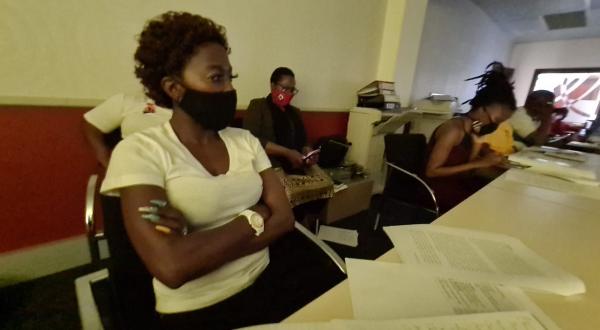SAFPU THUMB’S UP TO ITS FEDERATION ON GENDER AND HARASSMENT POLICIES.

South African Football Players Union (SAFPU) DSG Mr Motloung and Tshepiso Lethuloe, SAFPU’s Office Administrator, attended the South African Federation of Trade Unions (SAFTU) gender based violence meeting at NUMSA Head office in Johannesburg.
SAFTU is a federation of which SAFPU is an affiliated to. SAFTU is reliable for the organization of over 800 000 workers across the country. So then when this bold move was made on the Gender Policy and the Sexual Harassment Policy, you can be sure that it will rip through almost a million people like a tide.
For over 23 years of the Union’s existence the rights of footballers have been protected and defended – and perhaps as a male ‘army’ if you will – SAFPU understands all that makes up football. It is etched in our DNA.
The same respect needs to be served to women leadership in the game too – However, we are happy about the gender policy that is penned in black and white and covers SAFTU and all its affiliates. Be that as it may, the conference room was filled to capacity with both genders.
The gender lecture is being taught towards both directions, not only one gender, but both men and women.
From different affiliates, it is found that most women want to steer change. More importantly it was great to see men assisting in the plight of GBV which has gripped the country. Women and children are dying at the hands of perpetrators which are supposed to be called the Protectors within society.
The policy guides on gender differences as well as discrimination within the work place. It also highlights gender equalities as opposed to inequalities, respect, fair treatment within the work place but it also goes beyond work to home life and treatment that women bear once they retreat home, back to being a mother, a wife, a partner, away from their career lives.
The main purpose of the policy is to establish a clear vision and make commitments to guide the process of gender mainstream and woman empowerment, to influence policies, procedures and practices which will accelerate the achievement of gender equality, gender justice, non-discrimination and fundamental human rights.
Ms Lethuloe shared her sentiments around her attendance at this workshop that the development of woman leadership is important. She said: “The aim of women leadership rang true for me. We often see women especially in trade movements sent on training more than our male counterparts, but it also didn’t feel like a talk shop to me, being there felt like this is the start of a bigger agenda. I’m happy that this won’t be the last we hear of the Gender Policy. We as men and women differ yes - but we are more alike than we are different.”
